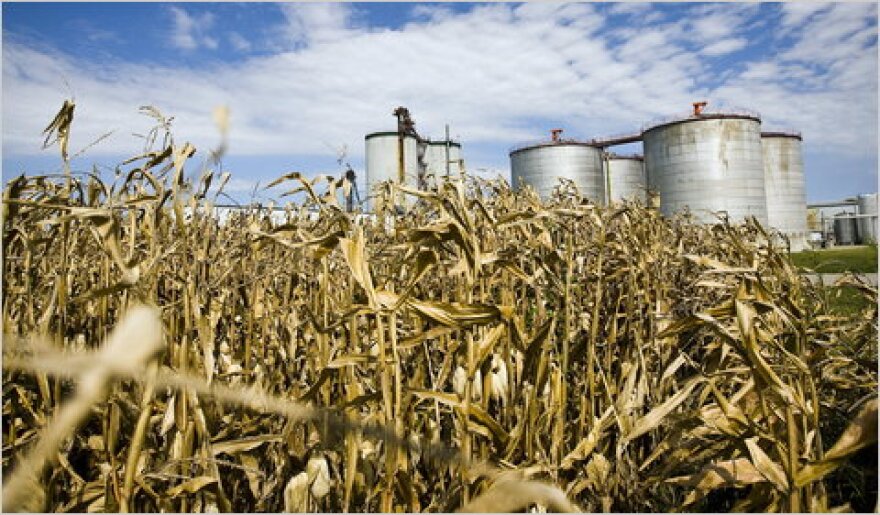With the increasing political polarization of Congress these days, it is sometimes hard to imagine anything positive coming out of Washington – especially with regard to environmental programs.
But there is at least one area where not only many Republicans and Democrats agree, but also – surprisingly -- environmentalists and oil industry lobbyists. And that is the need reform or repeal the Energy Policy Act signed into law by President George W. Bush in 2005. The act and a follow-up law mandate that about 10 percent of vehicle fuel in the U.S. be composed of corn-based ethanol. As a result, 40 percent of the corn grown in America today is used for fuel instead of food, up from just 9 percent in 2001.
According to a new report by the National Wildlife Federation, higher corn prices created by the mandate inspired farmers to plant more than 7 million acres of crops from 2008 to 2012 alone – an area larger than the state of Massachusetts. That meant the plowing under of many natural grasslands and wooded areas, causing the destruction of wildlife habitat. More acres of corn also led to more water pollution from increased spraying of chemical fertilizers and pesticides.
Julie Sibbing, a vice president at the National Wildlife Federation, said that several species of animals and insects – including monarch butterflies – are suffering population declines in part because of the ethanol-fueled expansion of cornfields and related spreading of agricultural chemicals.
“The bobolink, the western meadowlark, the sage grouse … there are many species that – if they haven’t quite made it yet to the endangered species list yet, they could all arrive there at the same time if we lose much more prairie,” said Sibbing. “There is less than 1 percent of native tall grass prairie left in the country. It’s the fastest declining ecosystem. In fact, the rate of conversion that happened after the passage of this policy was as severe as the tropical deforestation we are familiar with in Malaysia and in Brazil, in the Amazon.”
More locally, in the Chesapeake Bay region, nitrogen fertilizer has been seeping into estuary because of the expanded corn fields related to ethanol. In Maryland alone, farmers planted an additional 312 square miles of crops between 2005 and 2014 – or the equivalent of the combined landmass of Baltimore, Washington, D.C., and Philadelphia, according to figures from the U.S. Department of Agriculture.
Because the ethanol law’s mandate will keep growing and demanding more ethanol production through 2022, more than 100 lawmakers in the House – including conservative Republican Bob Goodlatte of Virginia and Democrat Peter Welch of Vermont -- are supporting a bill that would cap the ethanol mandate at the current level.
Goodlatte and Welch may not agree on much, but they agree on disliking the ethanol law.
“For the last 10 years, consumers have already been forced to foot the bill for the higher levels of ethanol blended into their gasoline,” Goodlatte said during a Congressional that discussed additional federal appropriation for the ethanol program. “Is it fair to ask them to pay another $100 million in order to prop up the ethanol industry?”
Welch noted that higher corn prices are a heavy burden for dairy farmers in his home state of Vermont and elsewhere, because these livestock owners must buy tons of corn to feed their animals. “It is causing significant difficulties in my state for our dairy farmers who purchase gain,” Welch said. “And one of the rising costs for them is the cost of grain, and one of the causes of that are these (ethanol) mandates that are pushing up their costs."
Others are pushing for more aggressive reform or even abolishment of the ethanol law. And these reformers are being supported by a variety of environmentalists, competing food producers, and even the oil lobby.
Frank Macchiarola is a director at the American Petroleum Institute, which opposes the ethanol mandate, which cuts into the oil industry’s profits. “It’s not a question of being against a fuel,” Macchiorola said. “It’s against a mandated fuel – which we don’t think is a free market principle. We don’t think is a principle that promotes competition. We think it promotes inefficiency.”
There was no question that the original intent of the ethanol law was good: to make America less dependent on foreign petroleum. But the law’s supposed environmental benefits have turned out to be less than advertised. And the need for more domestic fuel has become less urgent over the last decade, as hydraulic fracturing has sparked a near doubling of U.S. domestic oil production. So the time may be right for a re-examination of the policy.




